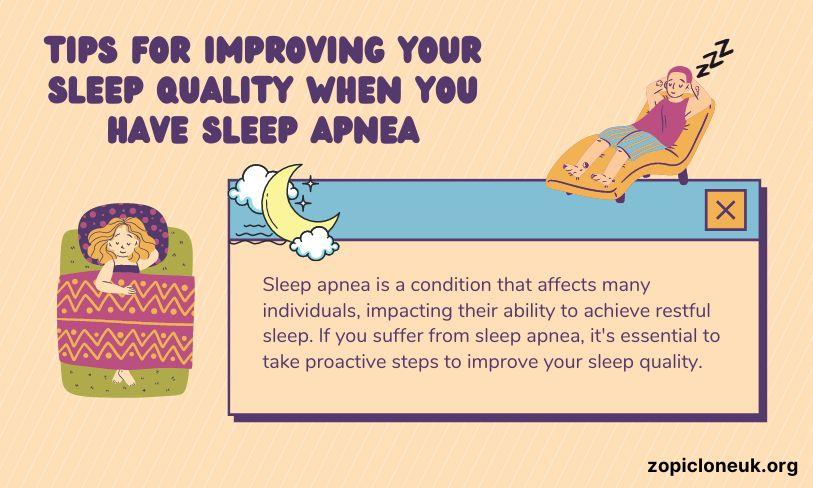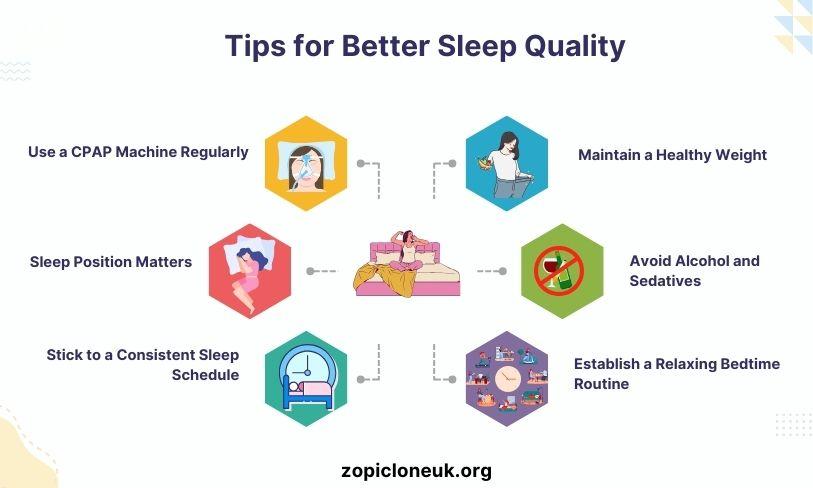
Tips for Improving Your Sleep Quality:- Sleep apnea is a condition that affects many individuals, impacting their ability to achieve restful sleep. If you suffer from sleep apnea, it’s essential to take proactive steps to improve your sleep quality. Here are some effective tips to help you manage sleep apnea and enjoy better sleep:
Contents
Understanding Sleep Apnea
Sleep apnea is characterized by pauses in breathing during sleep, often caused by relaxed throat muscles blocking the airway. This can lead to loud snoring, gasping, and interrupted sleep patterns.
Tips for Better Sleep Quality

- Use a CPAP Machine Regularly: Continuous Positive Airway Pressure (CPAP) therapy is considered the gold standard treatment for sleep apnea. It involves wearing a mask connected to a machine that delivers a steady stream of air pressure, keeping your airway open throughout the night. Consistent use of CPAP can significantly reduce symptoms such as loud snoring, interruptions in breathing, and daytime fatigue.
- Maintain a Healthy Weight: Excess weight, especially around the neck area, can exacerbate sleep apnea symptoms by putting pressure on the airway. Losing weight through a combination of a healthy diet and regular exercise can help alleviate these symptoms. Even a modest weight loss can lead to improvements in sleep apnea severity.
- Sleep Position Matters: Sleeping on your back can contribute to airway obstruction and worsen sleep apnea. Instead, try sleeping on your side to keep your airway more open. Using pillows to support your head and neck in a slightly elevated position can also help reduce snoring and improve breathing during sleep.
- Avoid Alcohol and Sedatives: Alcohol and sedatives relax the muscles in your throat, making it more likely for your airway to collapse during sleep. Avoid consuming these substances, especially close to bedtime, to minimize their impact on your sleep apnea symptoms.
- Stick to a Consistent Sleep Schedule: Going to bed and waking up at the same time every day helps regulate your body’s internal clock, promoting better quality sleep. Consistency in your sleep schedule reinforces your body’s natural sleep-wake cycle, making it easier to fall asleep and wake up feeling refreshed.
- Establish a Relaxing Bedtime Routine: Creating a calming bedtime routine signals to your body that it’s time to wind down and prepare for sleep. Activities such as reading a book, taking a warm bath, or practicing relaxation techniques like deep breathing can help reduce stress and promote relaxation before bed.
- Optimize Your Sleep Environment: Your bedroom should be conducive to sleep. Keep it cool, dark, and quiet to minimize disruptions that can interfere with your sleep. Consider using blackout curtains, earplugs, or a white noise machine to create a peaceful sleep environment .
- Regularly Consult with Your Healthcare Provider: Regular follow-ups with your doctor are essential for monitoring your sleep apnea and evaluating the effectiveness of your treatment plan. Your healthcare provider can adjust your CPAP settings, recommend additional therapies if needed, and address any concerns or changes in your symptoms.
FAQ
Q: Can sleep apnea be cured?
A: While sleep apnea cannot be cured, it can be effectively managed with the right treatments and lifestyle changes. Continuous use of CPAP therapy and maintaining a healthy lifestyle are key to managing symptoms.
Q: What should I do if I can’t tolerate CPAP therapy?
A: If you have difficulty tolerating CPAP therapy, discuss alternative treatments with your healthcare provider. There are other devices and surgical options available for treating sleep apnea, depending on the severity and specific characteristics of your condition.
Q: Are there any natural remedies for sleep apnea?
A: Lifestyle changes such as weight loss, positional therapy, and avoiding alcohol and sedatives can complement medical treatments for sleep apnea. However, it’s important to consult with a healthcare provider before trying any natural remedies to ensure they are safe and effective.
Q: How often should I replace my CPAP equipment?
A: CPAP masks, tubing, and filters should be replaced regularly according to the manufacturer’s recommendations. This ensures optimal performance and hygiene, reducing the risk of complications and improving comfort during use.
Q: Can children have sleep apnea?
A: Yes, children can also have sleep apnea, often due to enlarged tonsils or adenoids. If you suspect your child may have sleep apnea, consult with a pediatrician or sleep specialist for evaluation and appropriate management.
Conclusion
Improving sleep quality when you have sleep apnea requires a comprehensive approach that includes both lifestyle changes and medical interventions. By incorporating these detailed tips into your daily routine and working closely with your healthcare provider, you can effectively manage your sleep apnea and enjoy better overall health and well-being.
By addressing sleep apnea with a proactive and informed approach, you can significantly enhance your sleep quality and overall quality of life.
Author Details




Medical content by qualified psychiatrists
Our editorial policy

Zopiclone precautions Read our potential abuse notice

Looking for a seller? Locate the best Zopiclone vendor






